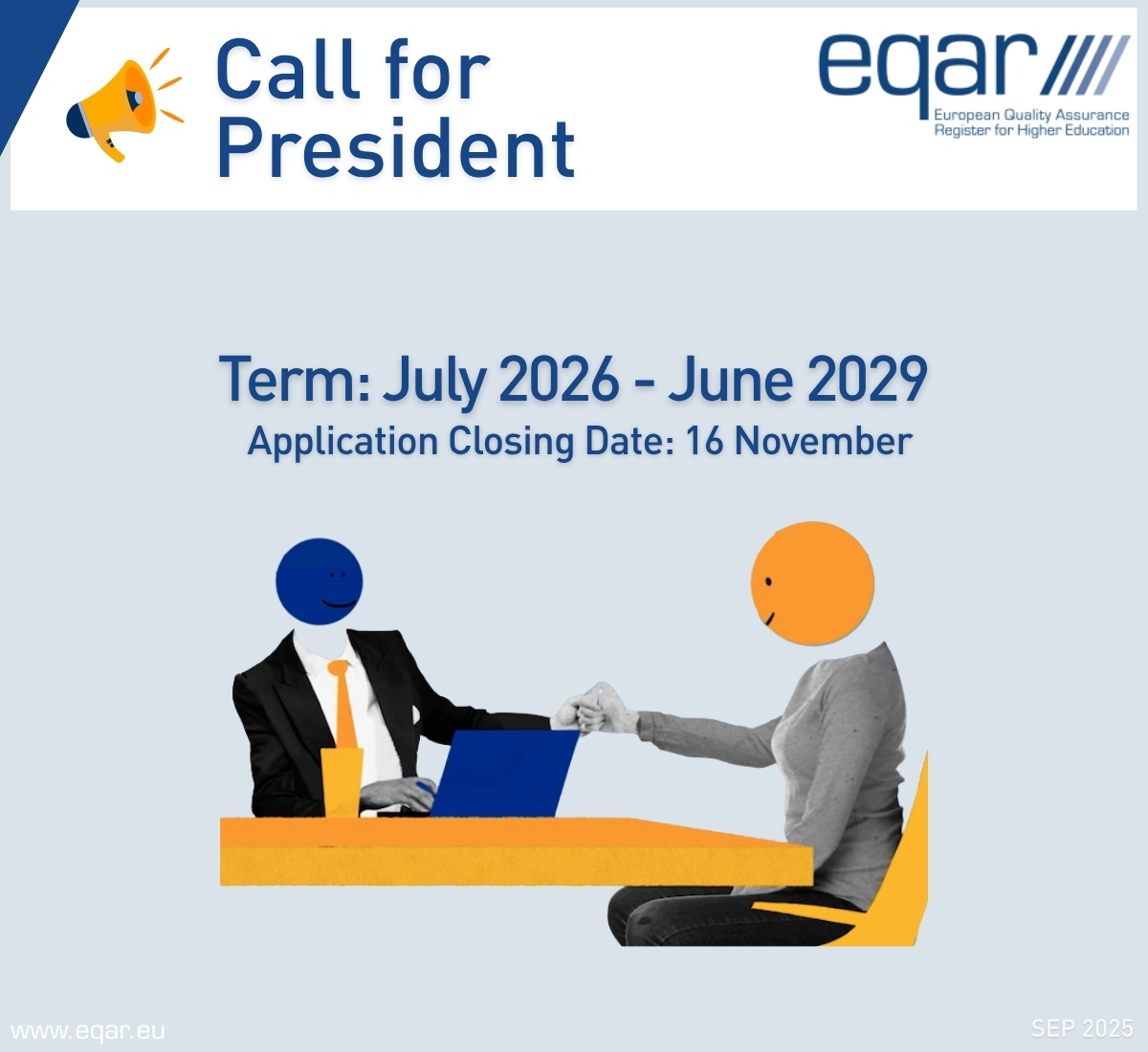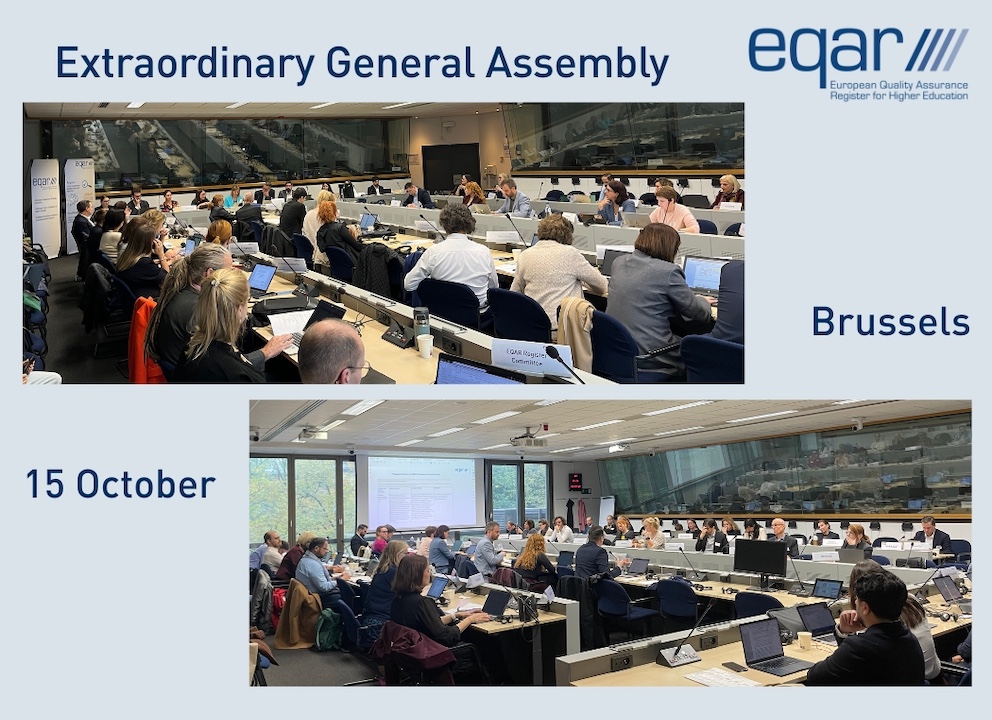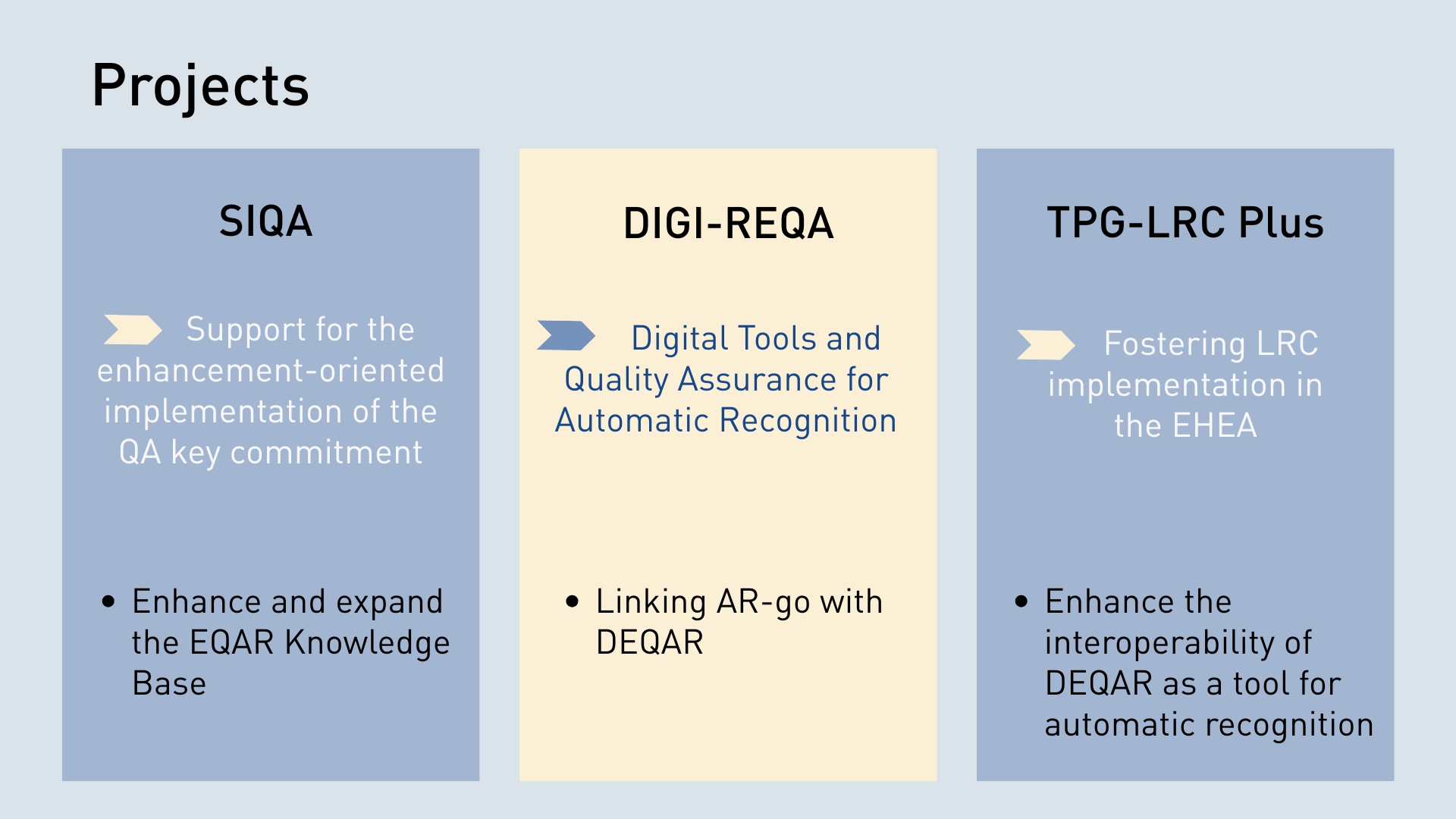EQAR NEWSLETTER - NOVEMBER 2025
News: Deadline for the Call for EQAR President approaches | Update Extraordinary General Assembly | Members' Dialogue 2025 | Projects
Deadline for the Call for EQAR President approaches
There is still time to apply, until 16 November, for the position of EQAR President. We are looking for a suitable individual to fill the position of President for the term 1 July 2026 until 30 June 2029.
Responsibilities - the President:
- Chairs the Board, the Register Committee and the General Assembly
- Represents EQAR externally at high-level meetings and events
- Ensures coherence in the work of all EQAR bodies
Required profile:
- Independence of EQAR’s members and quality assurance agencies
- Senior leadership experience in higher education
- Good knowledge of quality assurance and major general policy developments in higher education at the European level
- Ability to work with governments, quality assurance agencies, higher education institutions and stakeholder organisations
- Excellent command of English
Update Extraordinary General Assembly
 The General Assembly convened at the Centre Borschette in Brussels on 15 October to discuss various financial matters and to approve the budget 2026.
The General Assembly convened at the Centre Borschette in Brussels on 15 October to discuss various financial matters and to approve the budget 2026.
Members also provided input and asked questions about the revision of the Procedure for Applications (the binding regulations for the applications of QA agencies).
EQAR's next General Assembly will take place in Cyprus, on 10 March 2026 and will be hosted by the Cyprus Ministry of Education, Sport and Youth, in the framework of the Cyprus Presidency of the Council of the EU.
⇒ More about the Extraordinary General Assembly on our website
Members' Dialogue 2025
The 15th edition of the EQAR Members’ Dialogue (MD) took place in Brussels. We were delighted to see and interact with our members and to discuss the ESG revision, the European Approach for Quality Assurance of Joint Programmes and HE developments in general.
The MD, generously hosted by DG EAC, was well attended, with 63 participants in total, including all founding members, one social partner and 28 governmental members. The EQAR Register Committee and Appeals Committee were also represented at the event.
The MD's informal atmosphere facilitates exchange and networking among governments and stakeholders. Conversations carried on during dinner and, for some, extended later into the night.
Some sound-bites of our event to reflect upon:
- To quote ESG 3.3 on the independence of agencies: “Autonomous institutions need independent agencies as counterparts”. Going forward it will be crucial to analyse in more detail and address existing threats to the agency’s independence, but also to monitor and prevent potential decline in systems which currently appropriately safeguard this independence.
- The European Approach celebrates its 10th birthday this year! To move out of childhood into adulthood it will be necessary to address insufficient implementation of the European Approach in national regulations (at this point in time, only 21 out of 47 EHEA countries fully implement it), but also to guard against misimplementation in order to truly remove barriers to delivery of joint programmes that stem from accreditation frameworks.
- The new Council Recommendations commits to supporting the further development of DEQAR and encouraging publication of quality assurance reports in DEQAR, with the aim of facilitating recognition processes across Europe. When it comes to the European degree, it is foreseen that EQAR-registered agencies will be able to award this label to joint programmes.
⇒ Find out more about the Members' Dialogue, including the programme and presentations
Projects
EQAR is project partner in three recently launched projects, co-funded by the European Union through the Erasmus+ programme. One project focusses on automatic recognition (DIGI-RECA) and two on supporting the following two (out of three) key commitments, affirmed by EHEA ministers to be preconditions for the successful development and innovation of the EHEA:
- A robust internal and external quality assurance in line with agreed Standards and Guidelines for Quality Assurance in the EHEA (SIQA).
- Agreed principles for the recognition of qualifications as set out in the Lisbon Recognition Convention (TPG-LRC Plus).
1) SIQA - Support for the enhancement-oriented implementation of the quality assurance key commitment
The SIQA project, coordinated by ARACIS, kicked off on 17 July and the first Call for Applications for the Staff Mobility Programme in the field of Quality Assurance was sent out earlier this week. This Call is open to applicants wishing to send or host staff members and offers a unique opportunity to strengthen professional expertise, exchange knowledge and contribute to the implementation of the QA key commitment across the EHEA.
Another Call was sent out at the end of October; an invitation to members of the Bologna Process Thematic Peer Group C on Quality Assurance to participate in the Working Group on Cross-Border Quality Assurance (CBQA) in the EHEA. This working group will address key challenges related to cross-border quality assurance and contribute to the following outcomes:
- Updating the Key Considerations for CBQA in the EHEA
- Developing a related Code of Conduct
Enhancing the EQAR Knowledge Base
One of the project objectives for EQAR will be to update, enhance and expand the EQAR Knowledge Base. This will improve the applicability and usefulness of the EQAR Knowledge Base for monitoring the implementation of a range of Bologna process tools and commitments related to QA, including the key commitments of external QA in line with the ESG.
⇒ Check out the country information on the EQAR Knowledge Base
Analysis of implementation and best practices of the European Approach for QA of Joint Programmes
Another task for EQAR (together with ENQA and the TPG C members) is to support the TPG C members to amend legislative frameworks to allow the European Approach for QA of Joint Programmes by conducting an analysis of implementation and best practices.
2) DIGI-REQA - Digital Tools and Quality Assurance for Automatic Recognition
Connecting the AR-go tool with DEQAR
An important objective for EQAR in DIGI-REQA, a project coordinated by SKVC, is integrating quality assurance data by linking AR-go with DEQAR. AR-go is the tool used for generating automated statements of comparability for the qualifications covered by the Multilateral Treaty on Automatic Recognition of Qualifications, signed and ratified by the Baltic and Benelux countries and open for signatures to others.
The aim of the integration is to improve the digitalised services available to stakeholders covered under the Treaty, thus ensuring a more efficient and reliable recognition.
⇒ More about the DIGI-REQA project
3) TPG-LRC Plus - Fostering LRC implementation in the EHEA
The TPG-LRC Plus project kicked off in October and will support the implementation of the Bologna Process by focusing on the key commitment 2 on national legislation and procedures compliant with the Lisbon Recognition Convention (LRC) in the countries being part of the Thematic Peer Group B (TPG B).
EQAR’s main contribution to the project will be to enhance the interoperability of the DEQAR as a tool for automatic recognition. EQAR is also a key partner to focus on quality assurance.
⇒ More about the TPG-LRC Plus project
